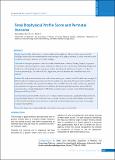Please use this identifier to cite or link to this item:
https://hdl.handle.net/20.500.14356/1874Full metadata record
| DC Field | Value | Language |
|---|---|---|
| dc.contributor.author | Manandhar, B L | - |
| dc.contributor.author | Giri, K | - |
| dc.contributor.author | Rana, A | - |
| dc.date.accessioned | 2023-05-30T04:54:15Z | - |
| dc.date.available | 2023-05-30T04:54:15Z | - |
| dc.date.issued | 2013 | - |
| dc.identifier.citation | ManandharB. L., GiriK., & RanaA. (2014). Fetal Biophysical Profile Score and Perinatal Outcome. Journal of Nepal Health Research Council. https://doi.org/10.33314/jnhrc.v0i0.403 | en_US |
| dc.identifier.issn | Print ISSN: 1727-5482; Online ISSN: 1999-6217 | - |
| dc.identifier.uri | http://103.69.126.140:8080/handle/20.500.14356/1874 | - |
| dc.description | Original Article | en_US |
| dc.description.abstract | Abstract Background: Sudden fetal demise, perinatal morbidity and mortality are still some of the major obstetrical challenges. Reduced fetal movements may have some bearing to fetal asphyxia and death, so timely detection of such condition and measures taken can prevent such mishaps. Methods: A descriptive prospective study was conducted at Tribhuvan University Teaching Hospital, Department of Obstetrics and Gynecology from January to December 2002 in 55 cases to find out the relationship of Biophysical Profile Score with perinatal outcome in pregnant mothers with decreased fetal movement counts at or above 34 weeks of gestational age. The mode of delivery, Apgar score, neonatal admission and perinatal mortality were analyzed. Results: The study demonstrated that most of the fetuses were in good condition with 87% of the cases scoring 8-10 BPS (normal), 6% scoring six (equivocal) and only 7% got four score (abnormal). Having the abnormal BPS of four significantly increased the risk of perinatal mortality by 50% (p=0.000). This study could not detect any significant association between Apgar score and neonatal morbidities, but showed significant correlation between BPS and caesarean section. The patients having lower BPS tended to undergo more caesarean section delivery than patients having normal BPS (p=0.009). Conclusions: An abnormal BPS of four in cases of reduced fetal movement counts significantly influenced the risk of perinatal death. However reduced fetal movements only did not raise the risk of fetal morbidity and mortality. So BPS should be beneficial to detect the fetuses at risk in the patients having less fetal movements for the proper management at right time. Keywords: Apgar score; biophysical profile score; fetal movements; perinatal mortality. | en_US |
| dc.language.iso | en | en_US |
| dc.publisher | Nepal Health Research Council | en_US |
| dc.relation.ispartofseries | Sep-Dec, 2013;403 | - |
| dc.subject | Apgar score | en_US |
| dc.subject | Biophysical profile score | en_US |
| dc.subject | Fetal movements | en_US |
| dc.subject | Perinatal mortality | en_US |
| dc.title | Fetal Biophysical Profile Score and Perinatal Outcome | en_US |
| dc.type | Journal Article | en_US |
| local.journal.category | Original Article | - |
| Appears in Collections: | Vol. 11 No. 3 Issue 25 Sep - Dec, 2013 | |
Files in This Item:
| File | Description | Size | Format | |
|---|---|---|---|---|
| 403-Article Text-486-1-10-20140207.pdf | Fulltext Download | 314.97 kB | Adobe PDF |  View/Open |
Items in DSpace are protected by copyright, with all rights reserved, unless otherwise indicated.
